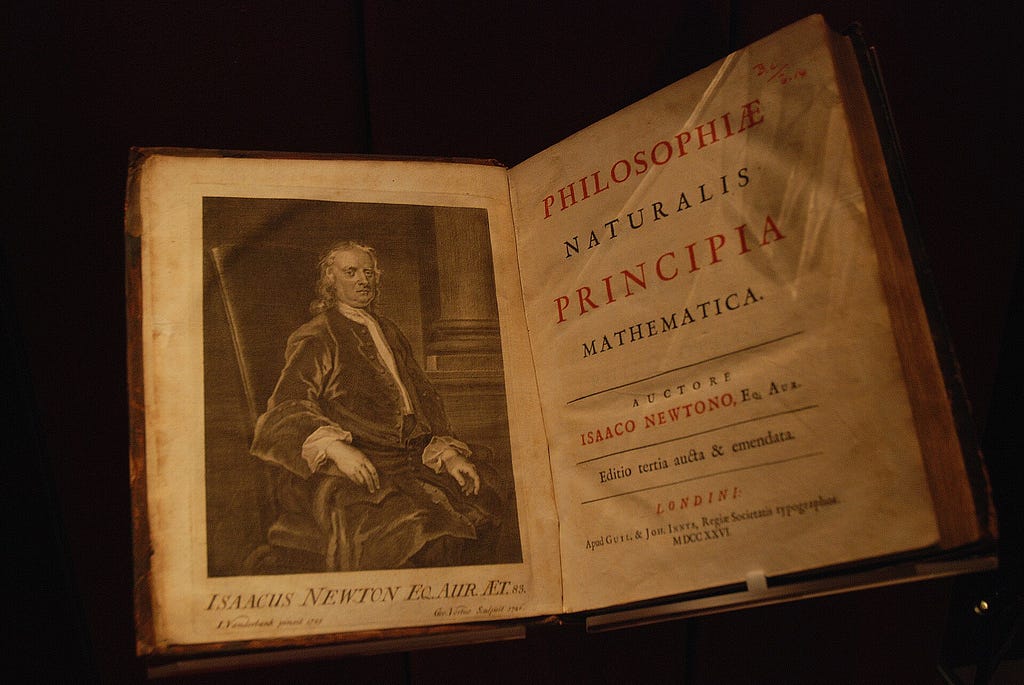Musings on how to prepare ourselves and steer a new direction of the craft and design now that AI is challenging the status quo
Why Silicon Valley has a weird Nietzsche obsession

Some Silicon Valley leaders have a bizarre adoration for philosophers like Adam Smith, Ayn Rand, and Friedrich Hayek. Alongside these thinkers, Friedrich Nietzsche is frequently mentioned in tech circles. This is done to propagate a survival of the fittest ideology. “The world is a competitive place, where the strong will eat the weak. This is human nature, and Nietzsche simply states the obvious.”
However, the question arises: Do these tech bros accurately describe Nietzsche’s philosophy? Or do they misinterpret his ideas? Do they simply parrot each other to justify corporate predatory behaviour?
In this text, I will look at the connections between Nietzsche’s ideology and recent decisions made by social media companies. I will use Nietzsche’s work The Gay Science as the foundation of his philosophy. Most of Nietzsche’s core principles are introduced in this book. All quotes in this text come from The Gay Science.
I am personally not a big Nietzsche fan, but that doesn’t matter. Using a radical thinker to assess conventions can be a powerful way to develop a fresh view on stagnating problems. In the case of social media… how should society address issues like fact-checking, blasphemy, defamation, and algorithms?
If Nietzsche were to replace Mark Zuckerberg as CEO of Meta, how might he redesign Facebook or Instagram?
How would Nietzsche interpret UX patterns, and which design changes would he propose? This article explores social media's morality through a Nietzschean perspective.

1. Nietzsche would be against any form of fact-checking
Mark Zuckerberg claimed in 2024 that fact-checkers are ‘too politically biased’ and ‘have destroyed more trust than they’ve created, especially in the U.S.’
Let’s not try to decide whether he was sincere or not. Yet, his emotional message shows a prevailing trend. There’s a vigorous ongoing debate on what truth is. Think about topics like Covid, climate change, or the history of any random country in a conflict. What are facts, what is true, and who would have the authority to enforce this truth? Regardless, how vital is the truth anyway?
According to Nietzsche, finding truth doesn’t advance humanity per se.
‘There is no pre-established harmony between the furtherance of truth and the well-being of mankind.’
Nietzsche claims that science compromises human nature. People naturally act to protect their lives. Self-preservation is our priority. Science limits this intuition.
For thousands of years, the world has functioned well without science, so it is not essential. History has proven that we can live with science.
Nietzsche’s view is quite clear in The Gay Science:
‘A “scientific” interpretation of the world … might still be one of the stupidest of all possible interpretations of the world.’

Science is stupid because it studies how the world operates mechanically without understanding its human aspects. Maths, geometry, equations, etc, don’t really exist in the real world. They are imaginary concepts that allow us to understand things.
‘How is explanation at all possible when we first turn everything into a picture?’
Furthermore, Nietzsche reasons that knowledge only becomes recognised as truth after a significant period.
‘The strength of knowledge lies not in its degree of truth, but in its age, its embeddedness, its character as a condition of life.’
Yeah, it took the Vatican a few hundred years to acknowledge that the Earth revolves around the Sun. It’s safe to say most people now consider this a truth.
Nietzsche is sceptical about truth and its gatekeepers. He provides another reason for being critical of fact-checking. He doesn’t believe the people responsible for fact-checking should have the power to act on behalf of others. People or institutions declare someone a specialist, but this is still a very arbitrary act.
What would Nietzsche do with fact-checkers on Facebook and Instagram? He would question the authority of those who hold the truth, similar to the sentiment expressed in recent years regarding social media. The world should live without any organisations, companies, or governments that decide what can be said or not, and what the truth is.
I will argue that Nietzsche is against any form of fact-checking.
2. Nietzsche wouldn’t be against hate speech
In 2017, Pakistani Taimoor Raza was accused of offending the Prophet Muhammad during a debate on Facebook. He was sentenced to death for posting blasphemous content.
This event is obviously seem extreme by European norms, but most Western countries do not have absolute free speech. Hate speech, Holocaust denial, and defamation laws are pretty standard.
Some Americans might scream ‘1st amendment’ now, but in the US, provoking violence, misleading consumers through ads, obscenity and child porn, and defamation are not protected under free speech laws.
Free speech always comes with a certain responsibility. In any country, also in the land of the free.
To understand Nietzsche's views on free speech, we must examine his attitude toward God. Most people probably know he is very critical of religion, but what’s the deeper meaning behind this?
A straightforward way to understand Nietzsche’s views on religion and morality is to consider his thoughts on polytheism. He believes that people created gods to cleanse themselves. Gods are moral arbiters, and you can use them to find guidance and purification. If you want to sanctify yourself in numerous ways, you need numerous gods.
Multiple gods express a ‘plurality of norms.’ These multiple gods, with multiple moralities, allow people to develop their uniqueness. If there are a plurality of gods, you can just select from the vast catalogue of views and pick the ones that suit your ideas.
‘Monotheism, in contrast … was perhaps the greatest danger to humanity so far.’
Nietzsche’s problem with monotheism is that it imposes a singular moral code. He strongly opposes the herd mentality and people buying into an established morality.
‘Morality is herd-instinct in the individual.’
Many monotheistic virtues are negative. They prohibit specific actions. Thy shall not…! Nietzsche doesn’t like this. Moral boundaries prevent humans from seeking their primary needs and acting according to their nature. Nietzsche’s ethics involve adopting positive actions. Morality should be about permission, not prohibition.
Someone should develop oneself as a unique individual, not a representation of a group. People should follow their nature and heart, not social dogma.

The well-known ‘God is dead! God remains dead! And we have killed him!’ passage is key to understanding Nietzsche. This section is his way of saying that society is slowly losing its social conventions, and that is a good thing.
The dead god stands for religion. Of course, but god is also used as a metaphor for other metaphysical views and social conventions. Yet, religion is responsible for most moral conventions. And faith is dead. However, that doesn’t mean that the underlying moralities won’t live on.
‘God is dead; but given the way people are, there may still for millennia be caves in which they show his shadow.’
Nietzsche’s viewpoint can be directly connected to the blasphemy trial in Pakistan. Nietzsche wants society to completely liberate itself from ancient beliefs and conventions, including religion and all other forms of social conventions. Mocking religion or norms is an important way to advance society.
‘Being honest even in evil is better than losing oneself to the morality of tradition’
In addition, Nietzsche presents the doctrine of the feeling of power. This idea presents Nietzsche’s ethics regarding hurting others. Whether we help or harm someone is not particularly relevant. Humans’ primary motivation is to maintain and extend their power.
Nietzsche sees the world as competitive and unfriendly; this is how society improves. Nietzsche believes history supports this view.
‘Hatred, delight in the misfortunes of others, the lust to rob and rule, and whatever else is called evil: all belong to the amazing economy of the preservation of the species.’
Powerful people use their strength to transform traditions and destroy common morality. Allowing the strong to prey on the weak will make the weak stronger, as they are forced to endure hardship. Nietzsche wants people to criticise each other, and there is almost no limit to how far one can go.
‘Hostility towards what is familiar, traditional, … constitutes what is really great, new, and amazing in our culture; it is the step of all steps of the liberated spirit.’
Nietzsche doesn’t mind friction between individuals. Insults are part of life and help to establish a social hierarchy.
The comment section behind a social media post should be a place where people have the right to speak their minds, even if this involves hate speech and defamation/libel. Everything that can be done to kick against beliefs and conventions is good for society.
It’s safe to say Nietzsche wouldn’t execute someone for blasphemy; in fact, he would encourage blasphemy. Nietzsche would favour minimal terms of use and content moderation.
Nietzsche is a free speech absolutist, so he would be against banning people or removing content.
3. Nietzsche would prefer Facebook-style like buttons, not the Instagram-like option
Given the decline in religious faith, finding purpose in life is a challenge for humanity. Nihilism can be the result of the death of god. But this is also undesirable.
Nonetheless, the decline of European morality creates opportunities to develop a new form of a healthier society. This can be the solution to both religion and nihilism.
For Nietzsche, Free spirits should experiment with new values. This is where gay in gay science comes into play. Nietzsche wants people to be gay; gay from gaiety, not from sexuality.
People should find humour in their suffering, in their happiness, and in their science. Nietzsche wants people to see the comedy of existence.
Don’t take life too seriously. Don’t take yourself too seriously. Be gay. This way, gaiety allows for a wide range of moral experiments.
On Instagram, one can only send a heart emoji. Besides posting a comment, the user has no other way of expressing their opinion on someone’s post. Mocking is not easy on Instagram.
Facebook allows for various emoji reactions: like, love, laugh, cry, etc. Nietzsche might like Facebook’s concept, but would still think most icons are too serious and compassionate. He would add more expressions to the options, including laugh at and disapprove emojis.
I argue Nietzsche would prefer the Facebook-style like buttons over the Instagram-like option, but with adjusted options.
4. Nietzsche would remove filters for selfies
Social media leads people to prefer their digital persona over their physical appearance. This phenomenon has escalated to the point where people visit a clinic to alter their facial features to match their online persona, so-called Snapchat Dysmorphia. This is the scientific term, but it is of course also applicable to other social media apps like Instagram.
People want to look like filters. Nietzsche would probably say, ‘also, also, also.’ This behaviour is quite different from the kind of happiness he encourages.
Nietzsche introduces two concepts to help people find their unique morality and innate happiness.
A. Eternal recurrence
The first concept is the spiritual exercise of eternal recurrence. Nietzsche invites people to think about a demon telling them:
‘This life as you now live it and have lived it you will have to live once again and innumerable times again; and there will be nothing new in it, but every pain and every joy … must return to you, all in the same succession and sequence.’
What if your life were to repeat itself again and again in exactly the same way? Would you make different life choices? Would you be more careful or brave if you knew those choices would have the same impact in your next, identical, life? Do you want this countless times again?
B. Amor fati
Nietzsche’s second central moral idea is amor fati. He argues that life events are unavoidable. Individuals must learn to accept them peacefully.
‘Bad or good weather, the loss of a friend, a sickness, … it shows itself immediately or very soon to be something that was not allowed to be lacking.’
Individuals must come to terms with their circumstances and affairs. Shit happens, better deal with it. People need to love their fate: amor fati.
Presenting yourself in an inauthentic way on social media is refusing your fate. Using filters to hide imperfections is incompatible with amor fati.
If Nietzsche were in charge of Instagram, he would remove the photo filter function.
I argue that how people present themselves on social media reflects their aspirations for future lives. They project a model of what they wish their eternal recurrence to look like instead of actively making this eternal recurrence happen.
Keeping an online illusion alive is more important than working on a real-life achievement.

5. Nietzsche would boost art in the algorithms
How would Nietzsche design algorithms and prioritise content? His desire for disruptive behaviour means that a system where the most liked posts are boosted would cause confirmation bias and enforce the status quo. This is undesirable.
So how does common taste change for Nietzsche?
‘Through individuals — powerful, influential, and without any sense of shame … they put many under pressure, which gradually turns into a habit among even more and finally becomes a need of everyone.’
Unconventional ideas might need to be aggressively pushed on the people. And, as seen earlier in this article, contradicting views are good too. Which posts would then be given a higher priority? Indeed, those who contrast the conventional sentiments, not the ones with the most likes.
Nietzsche’s most significant advice in The Gay Science is that art is the most valuable tool for human flourishing. We should become an aesthetic phenomenon.
Nietzsche thinks that art liberates people from the dreadful aspects of life. Art helps people not to take life too seriously, allows them to look beyond conventions, and to create new values.
‘We … want to be poets of our lives.’
Recent studies have shown that art can have a therapeutic impact on social media users. Therapies given on social media by showing art, music, and poetry significantly reduced PTSD among Nigerian war evacuees. Similar results were found with people traumatised by floods.
Given Nietzsche’s adoration for art, I argue he would change timelines to prioritise creative content over long texts or daily life photos.
Übergram or Zarathustrava — putting it all together
Based on Nietzsche’s views expressed in The Gay Science, I conclude that a Muskesque libertarian platform, without fact-checking, community guidelines, or reporting functions, would be his preference.
However, Musk’s X can’t be taken as a Nietzschean model. Nietzsche would prefer a system that encourages expression through art.
The algorithm would prioritise creative photo, video, and music posts over texts and long essays. However, it would elevate poetic posts.
Nietzsche wants to elevate people’s authenticity and unique views, so he would aggressively remove bots. He would also object to Meta and X's technique of making it easy for a single user to manage multiple accounts.
Nietzsche’s algorithm must also find a way to prioritise novel, confrontational, and polarising opinions, so the number of likes won’t be the main criterion for defining a post’s priority. The like button is too neutral and positive; new emojis that allow for insults and laughing at someone should be added.
Nietzsche wants people to satirise themselves and each other.
Nietzsche doesn’t show much appreciation for inclusion. Accessibility — a way to allow people with disabilities to use their service — won’t be a business priority. Data privacy, intellectual property, and advertising are beyond the scope of this text.

Conclusion
Margaret Thatcher famously slammed Hayek’s Constitution of Liberty on the table while expressing, ‘this is what we believe!’ Lenin drew significant inspiration from Marx. Marx would roll over in his grave if he knew how Lenin used his work, though.
Many influential people have been using philosophers to justify their ideologies. The authority of historical intellectuals is often misused to legitimise and sane-wash damaging ideas.
Nietzsche’s work contains considerable nuance, yet his ethics are not concerned with equality, inclusion, and socially responsible entrepreneurship.
Nietzsche prefers elevating the few rather than protecting the many. No wonder Silicon Valley billionaires find value in Nietzsche.
Prioritising the financial success of the elite over the digital safety of everyday people is a trend emerging in the US. Regulations on AI, payment/banking, and advertisements are revoked or made less strict, allowing companies to mislead consumers into unwanted choices.
I contend that applying the ideas of an ancient philosopher to modern issues, regardless of one’s political beliefs, provides perspectives that can more effectively justify or challenge societal values and tech designs. Nietzsche’s philosophy offers a powerful lens through which to examine the ethics of the digital age.
Whether fact-checking, blasphemy, and defamation are aspects worth regulating is something each nation-state needs to decide for itself. That is to say, if they have autonomy over their democratic process and if their decision-making is not hijacked by the very same tech CEOs.
How would Nietzsche redesign Instagram if he were Zuckerberg? was originally published in UX Collective on Medium, where people are continuing the conversation by highlighting and responding to this story.









